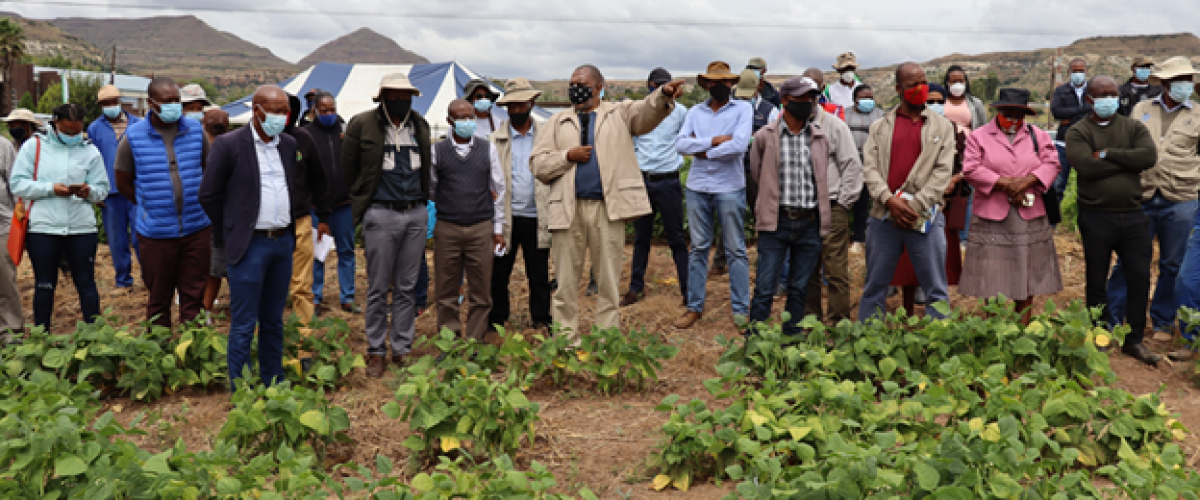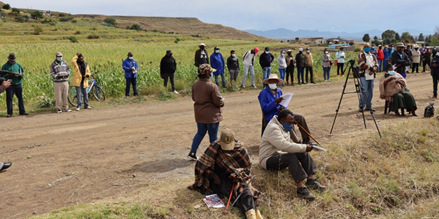
The Agricultural Productivity Programme for Southern Africa (APPSA) is a project supported by the World Bank which seeks to promote a regional approach to agricultural technology generation and dissemination by supporting, strengthening and scaling up of Regional Centers of Leadership on commodities of regional importance. APPSA is structured around four components of which one of them is technology generation and dissemination hence the reason for sub-projects that address this component. Note that APPSA is coordinated at regional level by the Center for Coordination of Agricultural Research and Development of Southern Africa (CCARDESA) and is also under implementation in Angola.
Field day
To engage community in experimental trial on beans as well as to showcase new varieties of maize and beans to the farming community while also disseminating information regarding these varieties the field day was held on the 17th March 2021 in two areas of the district namely: Mpharane and Mohlakeng in Makhaleng resource centre respectfully. The morning hours were dedicated for demonstration in Mpharane while the afternoon hours were for experimental trial in Mohlakeng.

Sub-Projects
The demonstration in Mpharane is being conducted under the sub-project Drivers to Technology Adoption and Profitability-Dissemination of improved technologies maize and beans in Lesotho and Angola. It is on-farm based and was conducted jointly by the Principal Investigator (PI) Ms Mokhantso Morahanye from the Department of Agricultural Research (DARS) and local Co-PI Mrs Nkhala Mokhethi from the Department of Crops, Dr K. Manuvanga being the Co-PI from Angola. The farmer (Mr Nkopane Seboka) as well as extension service in the area are closely involved in that demonstration. Mr Seboka explained to the rest of other farmers and invitees all the operations and specific time operations were carried out. Both beans and Maize are demonstrated. Bean Varieties demonstrated are NUA 45, local name ‘Lebete’, and Pinto Nodak. Mr Nkopane indicated that the two bean varieties performed well and will keep the ‘magic beans’ Lebete as seed for the coming season and promised to share some with farmers in his locality and nearby villages.
Most farmers are familiar with Pinto Nodak and some had planted it before. However, NUA 45 is not common to a large population of farmers. Most farmers showed interest on NUA 45 based on its advantages as were revealed by both the researcher and extension officers.
NUA 45 is recommended for children under 5 years old. It contains higher concentration of iron and zinc. Products made from NUA 45 were displayed for testing. Those were savoury bean biscuits, roasted bean flour and bean soup. Despite the impressive outcome from growing the new varieties, the farmer noted challenges such as high incidence of aphid infestation and excessive rainfall during the season.
Maize varieties demonstrated are ZM 521and ZM 523. These varieties are at green mealie stage during field day. The expectation is that maize will be ready for harvest by June.
The second activity is an experimental trial based in Mohlakeng being implemented by Professor Motlatsi Morojele from the National University of Lesotho under the sub-project Characterization of common bean (Phaseolus vulgaris L.) genotypes using morphological and molecular markers. He is working in collaboration with Co-PI from Angola Mrs Mónica Mbui. In this experimental trial, a total of two hundred and thirty (230) bean varieties were accessed from Malawi to select the most performing lines. This year (2021) is the first screening year whereby the best performing varieties in terms of high yielding, resistant to diseases and pests and harsh climatic conditions will be selected for further screening in the next cropping season.
Alongside the common bean trial, the PI is also undertaking research on soybeans, a study being funded by Research and Conference Committee from NUL. As a means of introducing more leguminous varieties to the farming community twenty-eight (28) varieties of soybean from Potchefstroom in South Africa are also being screened. The characteristics such as yield, adaptability, morphology, diseases resistance and nutrient content of the varieties will also be studied in this trial.
Participants

In an effort to observe Covid-19 protocols limited number of farmers and other relevant stakeholders were invited. Present were delegates from Ministry of Agriculture, Marketing and Food Security management; Mohales’ Hoek district administrator i.a; District Agricultural Officer; Director of Agricultural Research i.a; APPSA Project Director; representatives from non-governmental organizations; researchers from the National University of Lesotho, Lesotho Agricultural College, Department of Agricultural Researchers, farmers and seed producers.
The total number of expected stakeholders in this field day was 150 while the actual number of participants was 141. Sixty-two (62) were females while 79 were males.
Authors: Lefutso Ramokoatsi & Mokhants'o Morahanye






